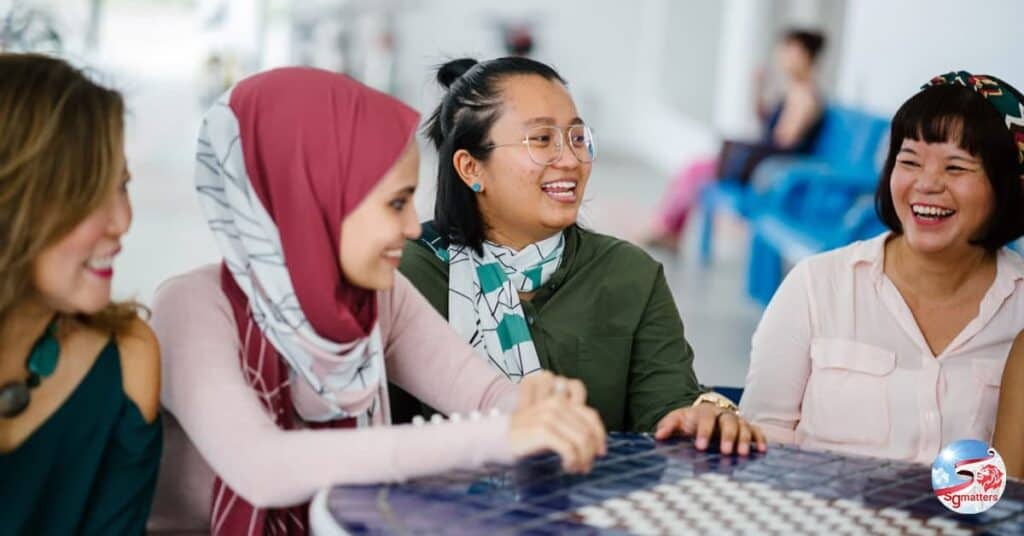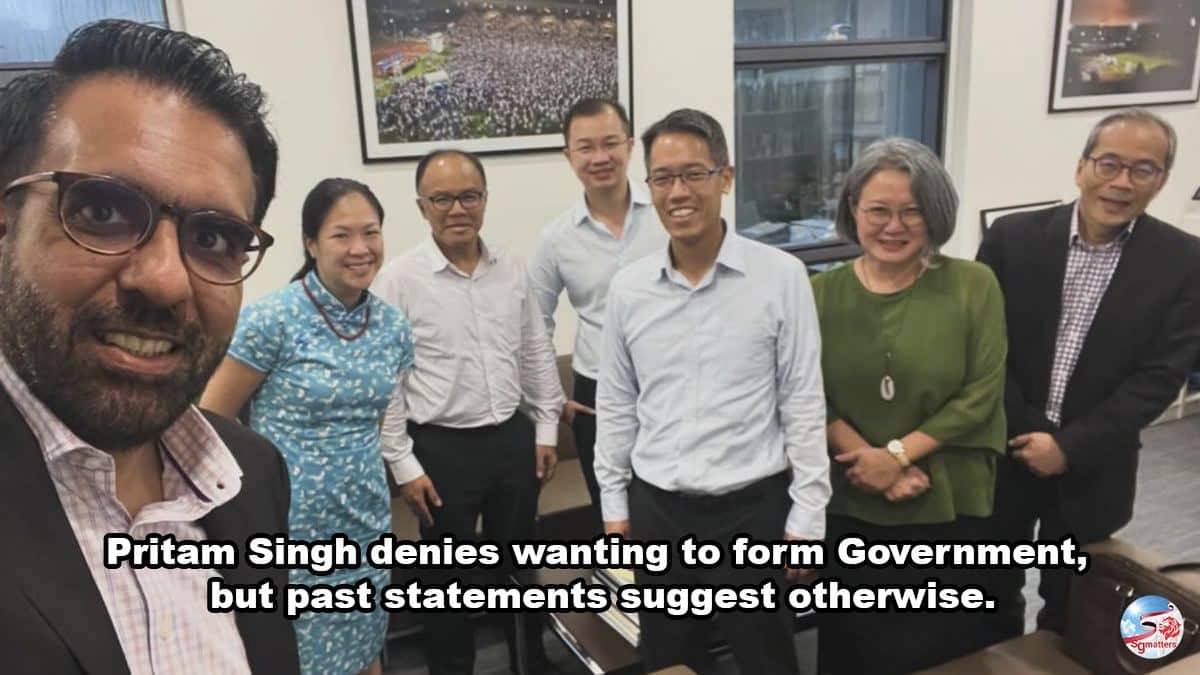SIX MONTHS AGO in August last year, Law and Home Affairs Minister Shanmugam met with Muslim religious leaders in a closed-door dialogue and told them that the government was considering allowing nurses to wear the tudung at work.
But the closed-door dialogues and discussions on the tudung did not start six months ago. It started years earlier. The discussions had been ongoing for a long time.
Discussions began many years ago
Back in early 2014, Prime Minister Lee Hsien Loong met with Malay-Muslim community leaders for a candid and heart-to-heart discussion behind closed doors on the tudung.

He said then that the fundamental and much broader issue underpinning the debate about whether women should be allowed to wear the Muslim headscarf in frontline public service roles is about the sort of society do we want to build in Singapore.
The closed-door dialogue was attended by some 100 leaders and representatives from the Malay-Muslim community.
Government’s position not static but change has to evolve gradually
Speaking to reporters after that dialogue, PM Lee pointed out that the government’s position has not been static, More statutory boards have corporate officers wearing the tudung. In fact, as then Minister-in-charge of Muslim Affairs Yaacob Ibrahim noted, “Muslim women enjoy many freedoms in Singapore. They don the hijab in many situations, including in Parliament, the highest elected chamber in the land.”
But the status quo should evolve gradually and in a broad and informal way, as attitudes and expectations change in society, and as people get used to new norms, PM Lee said.
It should not be pushed for in terms of rights and entitlements and to the detriment of the overall progress of harmony between the communities, he added.
Singapore cannot take any precipitous changes
PM Lee said that Singapore cannot take any precipitous changes, “especially in the aftermath of a hot and angry discussion”, as this can lead to misunderstandings.
The recent insults hurled on a religious teacher, Zahid Zin, unacceptable as it is, proves that discussions of such sensitive matters for which people have strong emotional attachment must take place behind closed doors.
As Mr Zahid said, “Precisely this is why discussions were held closed doors. Issues raised are close to the heart. People have strong emotional attachment to it but not many have the strength to discuss it gently and diligently.”

Irresponsible
It is thus irresponsible of Workers’ Party Faisal Manap to raise the issue in Parliament. His approach is divisive and clearly political. It’s meant to stir the angst of people. One must remember that Faisal also famously declared in Parliament that politics and religion cannot be separated. Just imagine the consequences if believers of every other religion adopt the same stand like Faisal Manap in Parliament, and freely mix politics with religion on every occasion. This fragile (yes, it is fragile and always work-in-progress) harmony that we have so diligently and conscientiously built, that is the envy of the world, will be fragmented in no time.
A closed door discussion on the tudung was held in 2017 and yet, WP Faisal Manap did not attend even though it was by public invitation. If he was sincerely interested, why did he not attend the discussion where he could lend his voice and views? While discussions behind closed doors had been ongoing for many years, Faisal chose to raise it in Parliament to score political points and claim credits when change has in fact evolved.
The rights of the Muslim woman
As former Mufti Shaikh Syed Isa Semait told the Berita Harian in 2013, the question to ask was whether all Muslim women working at the front line as nurses want to wear a hijab.
Expressing his opinion in a Facebook post, Mohamed Imran Mohamed Taib wrote that the conversations behind the tudung are mostly male-dominated. What Mr Imran has written is worth a read and pondering over.
Here’s what he wrote:
Aspek patriarki yang menebal ialah apabila kaum lelaki melihat diri mereka sebagai juara dan jurucakap bagi hak memakai tudung.
Para juara dan jurucakap ini memperjuangkan tudung bukan atas dasar anti-diskriminasi (kerana mereka senyap pula terhadap diskriminasi-diskriminasi lainnya) atau atas dasar hak pilihan bebas individu wanita (kerana mereka tidak membenarkan, malah menentang pilihan bebas individu wanita yang tidak mahu atau mahu membuka tudung, dengan segala macam ugutan dan cemuhan).
Para juara dan jurucakap ini memperjuangkan tudung kerana mereka melihat wanita sebagai sumber fitnah, sebagai tempurung moraliti bagi kaum lelaki. Bagi mereka, tudung ini adalah simbol Islam seolah-olah bangkit-jatuhnya maruah dan peradaban Islam tergantung atas sehelai kain yang menutup kepala wanita.
Isu sebenar bagi kaum lelaki yang patriarkal ini bukanlah hak dan agensi wanita sebagai individu tetapi hak lelaki untuk tidak digoda. Bagi menutup maskuliniti mereka yang rapuh dan penuh pergolakan nafsu dalaman, mereka menafsirkan tudung sebagai pakaian ‘sopan’ (seolah-olah tidak bertudung sama seperti tidak sopan malah berbogel). Ini kemudiannya dijadikan corak pandang dan diajarkan sebagai penanda seseorang itu benar-benar Muslim atau tidak. (Sepanjang sejarah Islam, tidak pernah tudung dianggap sebagai penanda keislaman seseorang!)
Oleh itu, yang ingin mereka pertahankan bukanlah hak, pilihan dan kepentingan wanita tetapi fikiran seksis dan misoginis mereka yang kemudian dijadikan alasan untuk memperjuangkan isu tudung dan menjadi jurucakap bagi kaum wanita tentang bagaimana mereka harus berpakaian dan mengapa.
Inilah masalah sebenar disebalik kekecohan isu tudung di dalam ruang-ruang perbualan masyarakat yang kebanyakannya didominasi kaum lelaki. Sehingga sekarang, jarang atau hampir tidak ada suara wanita Melayu dari sektor yang diperjuangkan. Ini menunjukkan satu perkara: isu yang boleh dibincangkan dengan tenang dan rasional mengikut prinsip multikulturalisme negara telah dijadikan medan mendesak atas dasar tuntutan agama. Ketika dibelek sebab sebenar, ternyata ada unsur patriarkis yang dibawa sesetengah golongan yang lantang ini.
Inilah yang merumitkan keadaan. Apatah lagi, isu ini dipolitikkan oleh sesetengah pihak – termasuk golongan bukan Islam – yang terikut-ikut bukan atas dasar prinsip, tetapi atas sentimen anti-pemerintah. Yang terlepas pandang ialah situasi sebenar di dalam sektor ini dan hak serta agensi mereka yang berada di dalam sektor ini. Isu tudung ini sudah menjadi macam-macam, setiap orang mengangkat agenda masing-masing melalui isu ini. Dan mendasari kehebohan isu ini tetap satu: budaya patriarki di kalangan lelaki Melayu.
As the matter now stands, Law and Home Affairs Minister Shanmugam has told Malay-Muslim community and religious leaders on Tuesday evening that the government was discussing the matter internally as it could see good reasons to make this change. He added that the Government would announce the outcome after consulting the community and other groups.
Credit goes to all who participated in the closed door dialogues, who contributed their views, the patience of the community leaders and their understanding, every group that understands that the overall progress of harmony between communities must come first.





